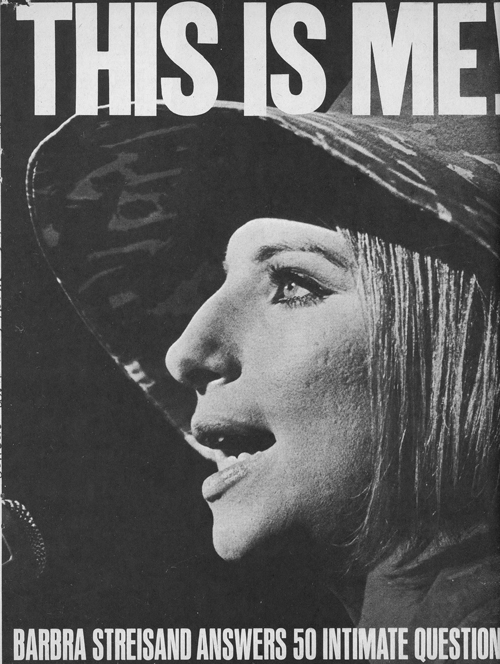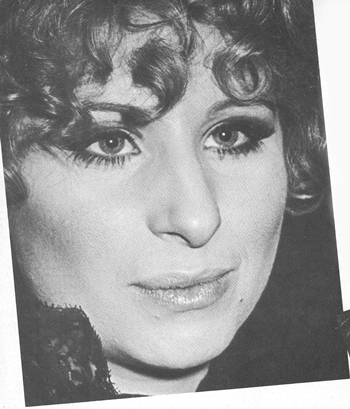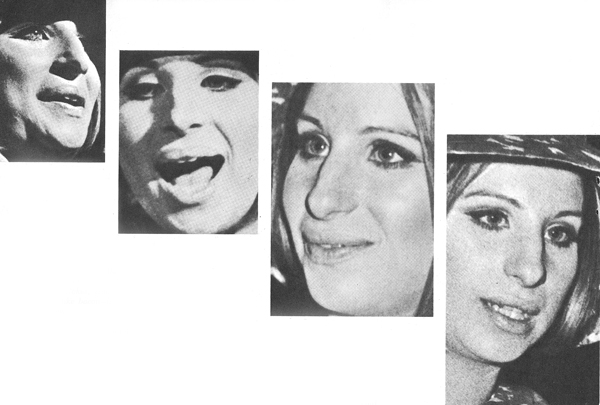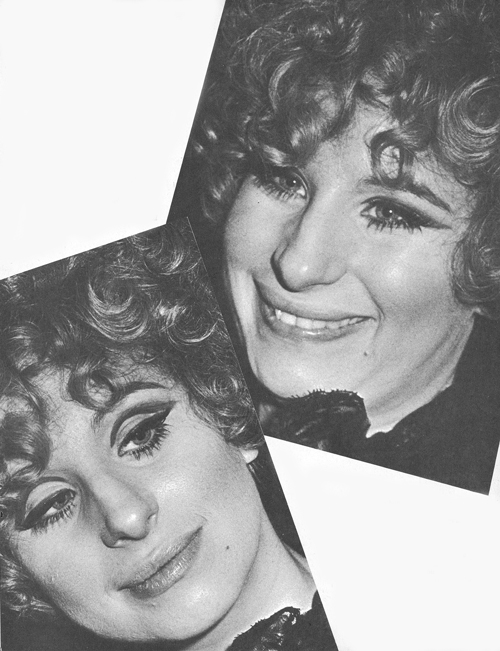Screen and TV Album
May-July 1969

This is Me!
Barbra Streisand Answers 50 Intimate Questions
Q: What is your real name, birth date, birth-place, height, weight, color of hair and eyes, marital status?
A: My real name is Barbara Joan Streisand—yep, there used to be an “a” in it. I was born in Brooklyn, New York, on April 24, 1942. I have brown hair and blue eyes, I'm 5’5” tall and when I'm not overweight I weigh 110 pounds. I was married to Elliott Gould in March, ‘63. (The Goulds separated in Feb. ‘68.)
Q: Why did you drop the “a” from your first name?
A: I thought it sounded unmusical.
Q: Any children?
A: My son Jason Emanual was born December 29, 1966. He's incredible, an incredible little human being, a great joy. The only real contribution I will ever make to this world.

Q: What do you remember best of your mother?
A: My mother is a very simple, non-intellectual, no-theatrical person who lives and breathes. I'm glad my mother is the way she is. It gives me new horizons.
Q: What do you remember best of your father?
A: My father died when I was fifteen months old, so I don't remember much of him. But he was a Ph.D. in English Literature and taught in the New York City schools.
Q: How did the loss of your father affect your life?
A: When a kid grows up missing one parent there's a big gap that has to be filled. It's like someone being blind, they hear better. With me, I felt more, I sensed more, I wanted more, you know, and if left me open to life.
Q: Any brothers or sisters?
A: I have an older brother, Sheldon, and a younger half-sister, Roslyn.
Q: What were family funds like as a kid?
A: We weren't poor poor—but we didn't have anything.
Q: What kind of a child were you?
A: As a child, I considered myself very ugly. But I had these dreams of being a star, of being in the movies. I always felt like a character out of Paddy Chayefsky.
Q: Do you recall any favorite toys?
A: I never had a doll, so I used a hot water bottle filled with water. And I swear it felt real, you know—like a rubber tummy. And I had this pink sweater on it cause the lady who took care of me was a knitting lady. So I had this sweater on it and I had a hat covering the screw part on the top. That was my doll.
Q: How did you do in school?
A: I got A's in all my subjects and D in conduct. See, I haven't changed at all! I remember in Yeshiva, they used to tell us that we couldn't say the word "Christmas." So as soon as the teacher went out of the room I'd say "Christmas, Christmas, Christmas," and be frightened to death that something would happen to me.
Q. What were you like as a teenager?
A. As a teenager I lived in another world. Sometimes I still do because the real world is so ugly. The teachers used to think I was crazy. I looked like a beatnik, but I loathed them as a group. I wore strange outfits. I invented my own make-up. I was close to no one.
Q. What is your own best quality? Worst fault?
A. I feel that self-doubt is both my biggest virtue and my worst fault. Self-doubt is a virtue because it never let me assume anything. I feel it's better to be open and vulnerable to hurt in doing one's work. But self-doubt can be a fault also. In everyday life people can take advantage of it—and wound you.
Q. Does it ever bother you to be a target for gossip?
A. I don't want people to think I'm a terrible human being. I'm not. If I were, it would show through on the screen. You can't really fool anybody on the screen. But when you are a star you are an open target—and the bigger the star, the bigger the target. You can't win. If you're bitchy and pompous, they don't like you. If you're normal and unassuming, they say you're uninteresting.
Q. What has been your greatest inspiration?
A. My mother egged me on. The more she said I'd never make it, that I was too skinny, the more determined I got.
Q. What are your favorite foods?
A. Banana splits, malteds, wonderful white, hot breads with the center filled with shrimp, broiled mushrooms and watercress, Cokes, cones, French fries that taste like bacon—like you get in greasy spoons.

Q. Do you like to read?
A. Yes, but my attention span is very short. I get involved with a book for a while, then I lose interest.
Q. Do you have any pets?
A. A French poodle named Sadie.
Q. What sort of evenings out do you prefer?
A. Casual. I'm not comfortable sitting down to a formal dinner. I'm more comfortable standing up and eating out of three pots on the stove.
Q. What would you change about yourself if you could?
A. Sometimes I don't like myself for being so ... basic. I feel maybe I should be more—you know—make the small talk, be more outgoing and all that. But it wouldn't be me. I can't cope with "You look lovely today" or "What a pretty dress." It makes me uncomfortable. If I dislike someone, I can't hide it. If I think an idea is lousy, I have to say so.
Q. Could you tell us some of the things you especially like?
A. Gardenias ... Victorian furniture small, fluffy white dogs . . . sea shells and country sounds ... Oriental philosophy ... all kinds of hats ... art nouveau ... antiques ... Indian music because it has the sound of the soul ... early morning ... big, soft, floppy beds ... working hard and being sometimes lazy too ... muted, subtle colors ... people who really care about what they do ... and tall, dark, handsome men who have a sense of themselves and feel their own worth.
Q. Do you feel Hollywood robs you of your privacy?
A. Let's put it this way—in Hollywood, if you get along with your leading man, then you're having an affair. If you don't get along, then you're having a feud. And neither is considered private!
Q. Have you changed much since you became a star?
A. Changed? I was never a figment of anyone's imagination. I wasn't created. Whatever motivated me when I was twelve motivates me now.... I was a peculiar kid. I had things on my mind. My ambitions to be, ah, you know, an actress.
Q. Can you spot a phony?
A. When I was a little kid—four or five— I would listen to people talking and I knew they were missing each other. I couldn't tell them, but I understood it. I've always understood ... something or other. The realities. I sense when people are coming on, or someone does a dishonest thing, or I walk into a room and something isn't right. I ... get it.
Q. Do you have any special philosophy about death?
A. Everything dies. By the time you reach puberty, you start to decay.
Q. In general, what are your dislikes?
A. Eggs, hospitals, bright red colors, liquor, the smell of ammonia, vulgarity, flat notes and people who assume too much familiarity too quickly.
Q. Which of your roles do you consider best?
A. Funny Girl is the part of my life.
Q. How do you react to criticism?
A. I can take criticism of my work, but I detest criticism of me personally.
Q. It is said you are hard to get along with. How do you answer this charge?
A. I never intend to be difficult or hard to get along with. When I'm performing, I'm not afraid of anything or anybody. But when I'm just me, I have this fear of being a disappointment to people, reporters or fans.
Q. What are your views on world affairs?
A. Our foreign policy is very ... unreal. I guess they think they are sticking to the American tradition or something. But all that waste and killing. Maybe we will just have to learn to lose some face. I mean, this is the destruction of the earth we're risking. In a way, it's probably all inevitable. The thing is that, so far, the scientific development exceeds our emotional development. Our leaders sometimes seem very childish. They don't seem to realize that we can destroy ourselves.
Q. Where do you prefer to live—New York or Hollywood.
A. New York.
Q. What's wrong with Hollywood?
A. It's like living in a small town—only worse. The weather is nice but then again, it isn't. How can you appreciate spring when you haven't had the winter?
Q. What are your feelings about people in show business?
A. People in this business are hard to relate to. On a real level, I mean. They relate in a show business way.
Q. Are you lazy or energetic?
A. I'm lazy. I used to want to be a ballerina. But I didn't want to devote my life to practicing. Singing, funnily enough, you build up muscles in the throat and diaphragm that makes it easy.
Q. Have you ever encountered any prejudice?
A. I don't know. I never applied to a country club.
Q. How do you feel about making movies as opposed to doing a Broadway show?
A. Making movies is easier because you can't hear the coughing of audiences, but harder because you can't hear the applause. But I prefer films to stage. It's something that lives after the moment.

Q. Do you ever stop thinking about your work?
A. No, never. I guess that's hard on the the people who live with me, but I can't.
Q. Are you dissatisfied with any part of your life?
A. Well ... I wanted to be a movie star and now I am. Now I sometimes wonder: "Was it worth it? Does it really matter?" Sometimes I wish I could be doing something—really vital.
Q. Does that mean that stardom isn't all it's cracked up to be?
A. It was much more pleasant to dream of being famous than to have the actual hard fact of it.
Q. What would you do if your success ended tomorrow?
A. Look. Everything is monetary. You do a good picture, great; you do a lousy one, nobody wants you. That's why you have to have a husband and children and antique furniture.
Q. Exactly what do you want from life?
A. What do I want? Everything!
Q. Would you ever consider any other career?
A. Yes. I would like to be a director.
Q. What do you think of your looks today?
A. I still have a long nose and I'm no candidate for a beauty contest. I still wear slacks and sweaters as often as I can. They aren't at all glamorous, are they? I'm probably the least appealing woman in show business. Some people have even suggested that I get a nose job. I may change my wardrobe, but I'm not changing my nose for anybody.
Q. Do you have any bitter memories of the past?
A. Well, I enjoyed my beatnik days, but I can't forget how casting directors slammed the door in my face. And if I wasn't wearing a $200 suit, I couldn't get the attention of a salesgirl in an exclusive store. That side of the spectrum was not so pretty.
Q. Do you like yourself?
A. If I really liked myself, I wouldn't be famous. Not liking myself is one of my motives for fame.
Q. What do you feel you have learned during your climb to the top?
A. I have to compromise—a little. I know that now. I've even come to understand that a little bit of compromise is part of the perfection. Know what I mean? A little bit of imperfection is part of the perfect, because perfection is lifeless and dull. But just a little compromise. If I don't feel it's right—forget it!
Q. Are you happy?
A. Are you kidding? I'd be miserable if I were happy!
Q. Do you ever worry about losing your voice?
A. Of course not. I think worry makes you lose your voice! No kidding, I don't believe in indulging my vocal chords. Mostly, what makes me sing is my inner self and my acting. And if I want to hold a note because I think it's right at the moment, I hold the note, and if I don't want to, I really can't. I never sing in the shower.... I never sing by myself ... my voice comes out awful. When I had a sore throat as a kid, my mother used to put a woolen sock around my neck (preferably used!). I still do that ... with a safety pin. One day the pin is gonna open in bed ... Ahhhgh! Puncture my vocal chords! That I worry about!
Q. Is there any role you would especially like to play now?
A. I'd like to play Juliet.
Q. Would you consider yourself a romantic?
A. No. I'm cynical. I never see the sunny side, the bells ringing when you kiss.
End.
[ top of page ]
